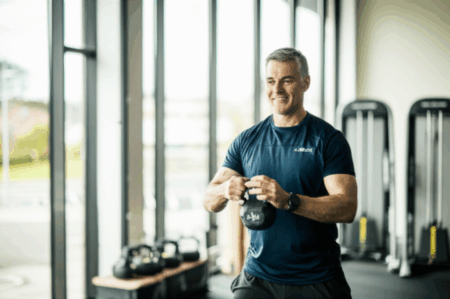A new study has revealed a significant link between muscle strength, cardiorespiratory fitness, and survival rates for cancer patients. The research, published in the British Journal of Sports Medicine, indicates that cancer patients with higher levels of strength and fitness have a substantially reduced risk of death. This finding underscores the importance of incorporating exercise into cancer care and survivorship programs.
The Power of Physical Fitness
The study, a meta-analysis of 42 studies involving nearly 47,000 cancer patients, showed that those with high muscle strength and cardiorespiratory fitness (CRF) had a 31% to 46% lower chance of dying from cancer, compared to those with low physical fitness levels. This effect was particularly pronounced in individuals with advanced cancers, as well as lung and digestive cancers.
Muscle Strength and Mortality
Muscle strength was primarily assessed through handgrip strength, a key indicator of overall physical health. Researchers classified “low” strength as grip strength under 13kg to 25.1kg for women, with higher measurements considered “high”. Notably, each unit increase in muscle strength was associated with an 11% decrease in the risk of death. These findings suggest that interventions focused on improving muscle mass can greatly benefit cancer patients.
Cardiorespiratory Fitness and Survival
Cardiorespiratory fitness, measured using tests like the 6-minute walk test or VO2 max, was another critical factor in the study. Individuals with high cardiorespiratory fitness saw a 46% reduction in the risk of dying from any cause. Furthermore, each unit increase in fitness was linked to an 18% lower risk of death specifically from cancer. This highlights that improving both muscle strength and cardiovascular health is essential for cancer patients.
Why Exercise Matters for Cancer Patients
The findings of this study add to a growing body of evidence highlighting the crucial role of exercise in cancer care. Regular physical activity offers several benefits for cancer patients, including:
Improved Treatment Response
Being active can improve how a patient responds to cancer treatment. It can help the body better withstand the rigors of surgery, chemotherapy, and radiation, and help in reducing complications from surgery and time spent in hospital.
Reduced Treatment Side Effects
Exercise is effective in managing and reducing the side effects of cancer treatment. This includes fatigue, a common and debilitating symptom. Resistance training has shown particular promise in reducing fatigue levels by reducing inflammatory markers in the body. Additionally, exercise may lessen depression and anxiety, and may improve sleep.
Enhanced Physical Function and Quality of Life
Cancer and its treatments can lead to muscle loss, weakness, and reduced mobility. Strength training and aerobic exercise can help maintain and improve physical function, allowing patients to regain strength, balance, and coordination, which are often impaired due to treatment. This, in turn, improves overall quality of life, enabling them to carry out daily activities with greater ease.
Reduced Cancer Recurrence
Studies suggest that physical activity may also play a role in reducing the risk of cancer recurrence. Being active and maintaining a healthy weight can reduce levels of hormones like oestrogen and insulin, which can encourage cancer cells to grow.
Stronger Immune System
Exercise can also boost the immune system, making the body better equipped to fight the disease and other illnesses. During muscle activation, a range of molecules are released that have cancer-suppressive effects and facilitate immune cell activity.
Exercise Recommendations for Cancer Patients
While the type and intensity of exercise should be tailored to individual needs and physical capabilities, here are some general recommendations for cancer patients:
Aerobic Exercise
Aim for at least 150 minutes of moderate-intensity or 75 minutes of vigorous-intensity aerobic activity per week. This can include activities like walking, swimming, or cycling.
Resistance Training
Incorporate strength training at least two days a week, focusing on major muscle groups. This can involve using weights, resistance bands, or bodyweight exercises.
Flexibility and Balance
Include stretching and balance exercises to maintain range of motion and prevent falls. Gentle activities such as yoga and tai chi can be beneficial.
Gradual Progression
Start slowly and gradually increase the duration, intensity, and frequency of exercise over time.
Consult Your Healthcare Team
Before starting any new exercise program, it is crucial to consult with a healthcare team, including doctors, physiotherapists, or accredited exercise physiologists. They can assess individual needs and provide personalized guidance.
Tailoring Exercise to Specific Needs
It is important to consider any specific medical conditions or limitations when developing an exercise plan. For example, those with bone metastases should engage in gentle activities, and avoid high impact exercise or contact sports. Individuals experiencing poor balance or coordination should also choose exercises that improve balance and muscle strength, or exercise while seated.
A Path to Improved Survival
The study’s findings emphasize the importance of viewing exercise as a crucial component of cancer care, not just an optional add-on. By embracing a physically active lifestyle, cancer patients can significantly improve their chances of survival, enhance their quality of life, and better manage the challenges of treatment. The integration of tailored exercise programs is a promising strategy that needs to be implemented in order to enhance the overall well-being of cancer patients.







